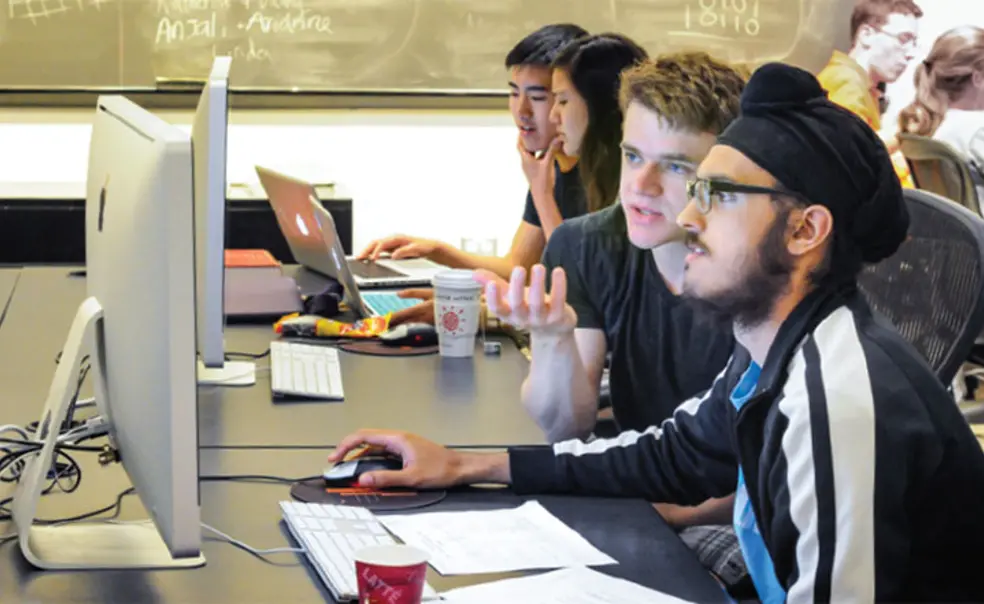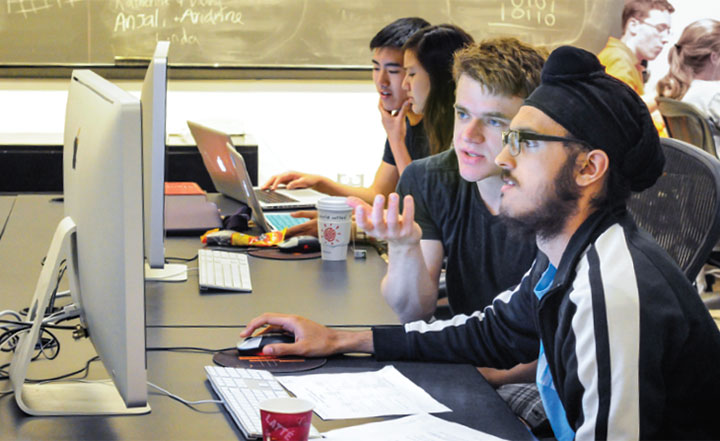The Power and Promise of Computer Science
When I matriculated at Princeton more than 35 years ago, my parents worried—as many parents do—that I might not find a job when I graduated. Fortunately, they put aside their concerns and let me pursue my intellectual passions, from physics to philosophy, from constitutional law to comparative literature. They imposed only a single restriction on my course selections—they insisted that I take at least one computer science class.
They were prescient. Over the last four decades, computers have transformed our society and our lives, revolutionizing how we communicate, interact, work, shop, travel, and play. Teenagers now spend their days tethered to phones and watches more powerful than the bulky VAX computer that I used to carry out the calculations required by my senior thesis.
When I took computer science from Professor Forman S. Acton in the early 1980s, the class was small, probably about 30 students. Now, Princeton undergraduates flock to the subject in droves. Computer science has become one of Princeton’s three largest concentrations and the department’s innovative introductory course, “General Computer Science,” has the largest enrollment of any undergraduate course this semester. Fifty-six percent of the Class of 2015 graduated having enrolled in at least one computer science course. The department is a leader among American universities in the percentage of female majors; in 2015, 28 percent of Princeton’s undergraduate computer science degrees were conferred to women, far surpassing the national average of 18 percent.
The field has obvious practical appeal—job openings have exploded. The U.S. Bureau of Labor Statistics has projected that between 2012 and 2022 we will see more job openings due to growth and replacements in computer occupations than in all other fields of science and engineering combined.
The power and promise of computer science go far beyond job openings. Computer science brims with intellectual excitement, offering new insights into age-old questions and novel ways to solve major societal challenges. In a 2010 report, the President’s Council of Advisors on Science and Technology declared that advances in “networking and information technology” were “at the center of our Nation’s ability to achieve essentially all of our priorities and to address essentially all of our challenges.”
Princeton’s computer science professors are asking questions about the potential of artificial intelligence and machine learning, the relationship between genomes and diseases, Internet privacy and security, and the reconstruction of damaged artwork— to name just a few topics.
Many human endeavors and scholarly disciplines now emphasize not concrete answers to particular questions, but rather algorithms, or recipes, for producing such answers. These algorithms automate our work and yield unprecedented insights into the problems we are solving. Algorithms enable biologists to analyze the human genome, sociologists to graph social networks, and financiers to evaluate reams of commercial data. Computational thinking is rapidly becoming the fourth leg of knowledge, along with “reading, writing, and ‘rithmetic.”
In light of the extraordinary demand for computer science classes (from concentrators and non-concentrators alike) and the pathbreaking research taking place in the field, Provost David S. Lee, Dean of the Faculty Deborah Prentice, and I have taken an unusual step: we added 10 new faculty slots to the department. Annual Giving dollars enabled us to authorize the department to begin hiring immediately in advance of fundraising to support its expansion over the long term.
The new faculty positions will allow the department to build on this University’s storied tradition in computer science and related fields. Alan Turing *38, often described as the founder of modern computer science, earned his doctorate in mathematics at Princeton, studying with other giants of the field including Professor Alonzo Church ’24 and Professor John von Neumann.
Princeton’s computer science department is an intellectual powerhouse and a fertile training ground for scholarly talent, sending high numbers of both undergraduate and graduate alumni onto the faculties of leading universities. Indeed, both the current chair of Princeton’s department, Jennifer Rexford ’91, and her immediate predecessor, Andrew Appel ’81, are undergraduate alumni of the University.
Princetonians from across the disciplines, including computer science, economics, and electrical engineering, have been at the forefront of the digital revolution outside the academy, too. The creative leadership of Jeff Bezos ’86 (Amazon), Tom Leighton ’78 (Akamai), Eric Schmidt ’76 (Google and now Alphabet), Meg Whitman ’77 (eBay and now Hewlett Packard Enterprise and HP Inc.), and other alumni has, to put it quite simply, changed our world.
The pace of that change has been dazzling. Few of us could have foreseen 20 years ago the technology that is today so familiar, and so intertwined with our lives, that we can barely imagine living without it. It is hard to say what miracles or challenges the future will bring, but this much is clear: computer science is critical to the world’s future and to Princeton’s mission, and we will need to invest in it aggressively to sustain the excellence of our superb department.














No responses yet